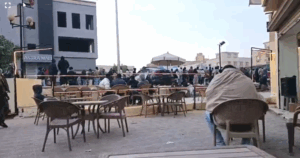Sudan launches 2019 Human Development Report
On Wednesday, the UN Development Programme (UNDP) Sudan, in partnership with the University of Khartoum, launched the global Human Development Report.
The topic of this year’s report “Beyond Income, Beyond Averages, and Beyond Today” was widely received by many academics, development practitioners, civil society representatives, media and government officials who attended the launching ceremony that took place at the University of Khartoum.
 Sudan launches the 2019 Human Development report, Khartoum, December 10, 2019 (UNDP)
Sudan launches the 2019 Human Development report, Khartoum, December 10, 2019 (UNDP)
On Wednesday, the UN Development Programme (UNDP) Sudan, in partnership with the University of Khartoum, launched the global Human Development Report.
UNDP reported in a press statement on Tuesday that the topic of this year's report “Beyond Income, Beyond Averages, and Beyond Today” was widely received by the many academics, development practitioners, civil society representatives, and media and government officials who attended the launching ceremony which took place at the University of Khartoum.
According to the report, inequality weakens social cohesion and damages people's trust in governments and institutions.
“The report focuses on how to improve human development outcomes by addressing the root causes of the obstacles faced, and by proposing innovative ways to surmount these challenges” Mohamed El Shabik, Undersecretary of the Ministry of Labour and Social Development, commented.
“I really believe that partnerships such as the one we are witnessing here today between the Ministry, the UNDP, and the University of Khartoum will help push forward the development agenda in Sudan.”
UNDP Resident Representative Dr Selva Ramachandran stated that “Despite unprecedented progress against poverty, hunger, and diseases, systemic inequality affects the chances of millions of human beings for leading a fulfilling life.
“Unless systemic processes that create and perpetuate socio-economic, political and environmental inequality are reversed, democratic norms risk being undermined as politics is increasingly controlled by concentrated oligarchies,” he warned. “Such a future would not be conducive to the success of the Sudanese transition to democracy and peace.”
Radio Dabanga’s editorial independence means that we can continue to provide factual updates about political developments to Sudanese and international actors, educate people about how to avoid outbreaks of infectious diseases, and provide a window to the world for those in all corners of Sudan. Support Radio Dabanga for as little as €2.50, the equivalent of a cup of coffee.












 and then
and then